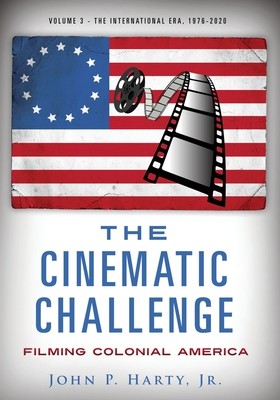
- We will send in 10–14 business days.
- Author: John P Harty
- Publisher: LANGDON STREET PRESS
- ISBN-10: 166282338X
- ISBN-13: 9781662823381
- Format: 17.8 x 25.4 x 2.4 cm, minkšti viršeliai
- Language: English
- SAVE -10% with code: EXTRA
Reviews
Description
YOUR GUIDE TO COLONIAL FILMS
DURING THE INTERNATIONAL ERA, 1976-2000
With the death of the old Hollywood system, a new structure of global telecommunication networks rose in its place spearheaded by the independent multi-national production company, the million dollar actor and the bundle-master/talent agent. Could quality filmmaking about colonial America survive in this new corporate Hollywood, which advocated the use of global screenplays to attract world-wide audiences for their products? The Cinematic Challenge delves into this question and uses in-depth case studies of five films to considered: Was Hugh Hudson a self-indulgent perfectionist or an idealistic, visionary auteur when he filmed Revolution using an avant-garde non-linear approach to storytelling? Did Bruce Beresford 's Black Robe succeed in creating a unique adventure saga about a Jesuit priest pushed to the limits of his religious beliefs and physical endurance in the hostile interior of 17th century New France? How was Michael Mann's "re-imagining" of The Last of the Mohicans different from the James Fenimore Cooper novel and the 1936 film classic? Was Ted Turner successful in presenting a more balanced view of the Native Americans or did The Broken Chain only succeed in creating a new set of myths about an idyllic indigenous people corrupted by evil Europeans? How did Roland Emmerlich 's The Patriot manage to pass through development hell and become one of Columbia Pictures tentpole attractions for 2000?
This study will explain to what degree each of the colonial films represented America's sociopolitical history and how the films encapsulated the state of mind of the American people at the time of their release, making it the most in-depth resource available today on this subject.
Publication of volume 3 of The Cinematic Challenge completes author John P. Harty, Jr.'s decade-long desire to write a complete history of the films about colonial America produced in the 20th century. He holds a bachelor's degree in history, a master's degree in political science and has studied Russian and English history at the doctoral level at New York University.
EXTRA 10 % discount with code: EXTRA
The promotion ends in 23d.07:15:18
The discount code is valid when purchasing from 10 €. Discounts do not stack.
- Author: John P Harty
- Publisher: LANGDON STREET PRESS
- ISBN-10: 166282338X
- ISBN-13: 9781662823381
- Format: 17.8 x 25.4 x 2.4 cm, minkšti viršeliai
- Language: English English
YOUR GUIDE TO COLONIAL FILMS
DURING THE INTERNATIONAL ERA, 1976-2000
With the death of the old Hollywood system, a new structure of global telecommunication networks rose in its place spearheaded by the independent multi-national production company, the million dollar actor and the bundle-master/talent agent. Could quality filmmaking about colonial America survive in this new corporate Hollywood, which advocated the use of global screenplays to attract world-wide audiences for their products? The Cinematic Challenge delves into this question and uses in-depth case studies of five films to considered: Was Hugh Hudson a self-indulgent perfectionist or an idealistic, visionary auteur when he filmed Revolution using an avant-garde non-linear approach to storytelling? Did Bruce Beresford 's Black Robe succeed in creating a unique adventure saga about a Jesuit priest pushed to the limits of his religious beliefs and physical endurance in the hostile interior of 17th century New France? How was Michael Mann's "re-imagining" of The Last of the Mohicans different from the James Fenimore Cooper novel and the 1936 film classic? Was Ted Turner successful in presenting a more balanced view of the Native Americans or did The Broken Chain only succeed in creating a new set of myths about an idyllic indigenous people corrupted by evil Europeans? How did Roland Emmerlich 's The Patriot manage to pass through development hell and become one of Columbia Pictures tentpole attractions for 2000?
This study will explain to what degree each of the colonial films represented America's sociopolitical history and how the films encapsulated the state of mind of the American people at the time of their release, making it the most in-depth resource available today on this subject.
Publication of volume 3 of The Cinematic Challenge completes author John P. Harty, Jr.'s decade-long desire to write a complete history of the films about colonial America produced in the 20th century. He holds a bachelor's degree in history, a master's degree in political science and has studied Russian and English history at the doctoral level at New York University.


Reviews